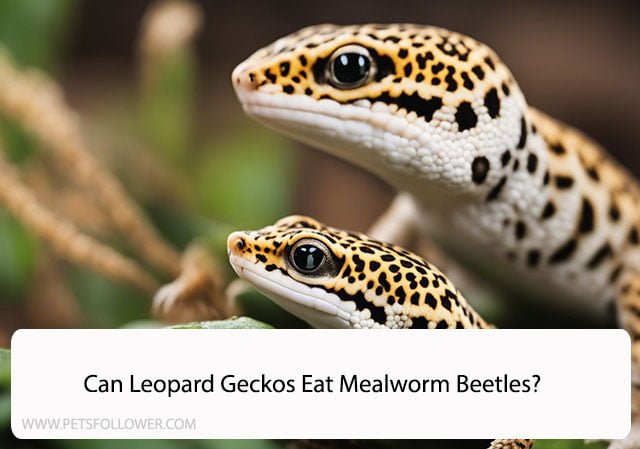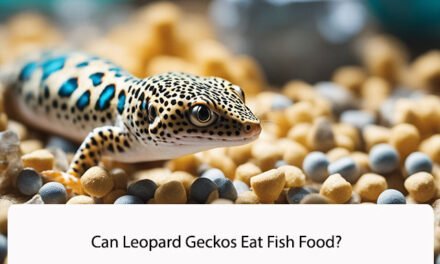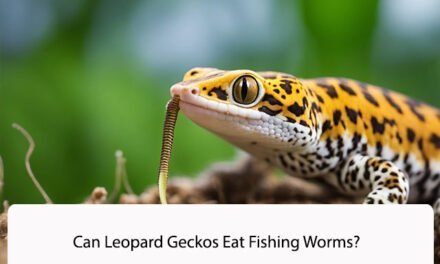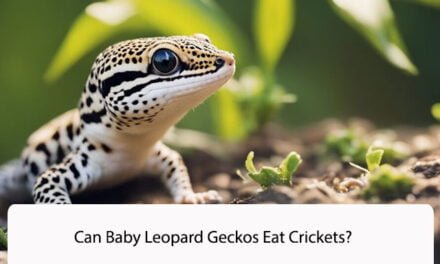Leopard geckos are one of the most popular pet reptiles in the world, and for good reason. They are easy to care for, docile, and have a unique personality that makes them a joy to own. However, one of the most common questions that leopard gecko owners have is whether or not their pets can eat mealworm beetles.
The short answer is yes, leopard geckos can eat mealworm beetles. In fact, many owners use mealworm beetles as a source of protein for their geckos. However, there are some things that you need to keep in mind before feeding your leopard gecko mealworm beetles. For example, you should never feed your gecko beetles that are too large, as they can cause impaction or other digestive issues. Additionally, you should always make sure that the beetles are properly gut-loaded and dusted with calcium and other essential vitamins and minerals before feeding them to your gecko.
In this article, we will explore the topic of whether or not leopard geckos can eat mealworm beetles in more detail. We will discuss the nutritional value of mealworm beetles, how to properly prepare them for your gecko, and any potential risks or concerns that you should be aware of. By the end of this article, you should have a clear understanding of whether or not mealworm beetles are a suitable food source for your leopard gecko.
Dietary Basics of Leopard Geckos

Leopard geckos are insectivores, which means they primarily eat insects. In the wild, they consume a variety of insects, including crickets, mealworms, waxworms, and roaches. In captivity, it is important to provide them with a balanced diet to ensure optimal health.
Nutritional Needs
Leopard geckos require a diet that is high in protein and low in fat. They also need a variety of vitamins and minerals to maintain their health. A diet that is deficient in any of these nutrients can lead to health problems.
Protein is essential for the growth and maintenance of muscle tissue. It also plays a role in the production of hormones and enzymes. Insects such as crickets and mealworms are good sources of protein for leopard geckos.
Leopard geckos also require calcium and vitamin D3 for proper bone growth and maintenance. Calcium is important for muscle function and blood clotting, while vitamin D3 helps the body absorb calcium. A lack of calcium or vitamin D3 can lead to metabolic bone disease, which can be fatal.
Feeding Frequency
Leopard geckos should be fed every other day. They should be offered a variety of insects to ensure they are getting a balanced diet. It is important to avoid overfeeding, as this can lead to obesity and other health problems.
Leopard geckos should be fed insects that are appropriate for their size. Young geckos should be fed smaller insects, while adult geckos can be fed larger insects. It is also important to provide a shallow dish of water at all times to prevent dehydration.
In conclusion, leopard geckos require a balanced diet that is high in protein and low in fat. They also need a variety of vitamins and minerals to maintain their health. By providing them with a proper diet and feeding schedule, you can ensure they live a long and healthy life.
Understanding Mealworm Beetles
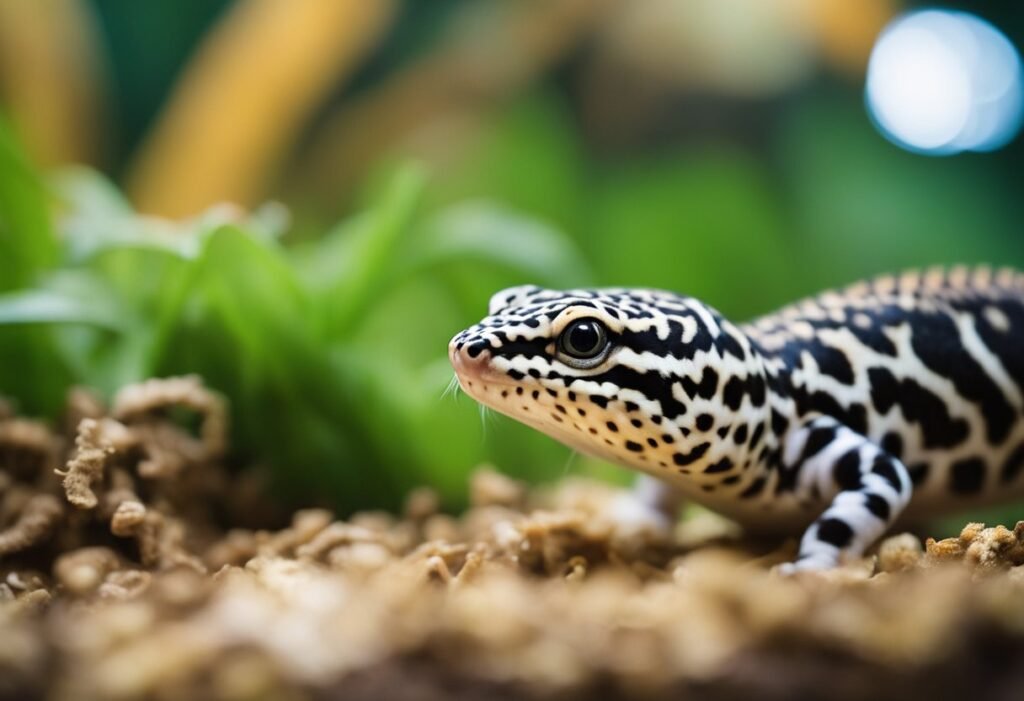
Mealworm beetles are a common food source for leopard geckos. These beetles are the adult form of mealworms, which are the larvae of the darkling beetle. In this section, we will discuss the lifecycle of mealworm beetles and their nutritional profile.
Mealworm Beetle Lifecycle
Mealworm beetles go through a complete metamorphosis, which means they have four distinct life stages: egg, larva, pupa, and adult. The eggs are small and white and are laid in soil or substrate. The larvae hatch from the eggs and are commonly known as mealworms. They are yellowish-white in color and have a hard exoskeleton. As they grow, they shed their skin several times, and each time they molt, they become larger.
After several molts, the mealworms enter the pupal stage, during which they transform into adult beetles. The pupae are white and soft-bodied and are usually found in soil or substrate. After a few weeks, the adult beetles emerge from the pupae and are ready to mate and lay eggs.
Nutritional Profile
Mealworm beetles are a good source of protein and fat for leopard geckos. They also contain some vitamins and minerals, including calcium, phosphorus, and potassium. However, they are not a complete food source and should be fed in combination with other insects and a balanced diet.
It is important to note that mealworm beetles have a hard exoskeleton that can be difficult for leopard geckos to digest. To make them easier to digest, you can gut-load them with nutritious foods like fruits and vegetables or dust them with calcium powder before feeding them to your gecko.
In conclusion, mealworm beetles are a nutritious food source for leopard geckos, but they should be fed in moderation and in combination with other insects and a balanced diet. Understanding their lifecycle and nutritional profile can help you provide the best care for your gecko.
Benefits of Mealworm Beetles for Leopard Geckos
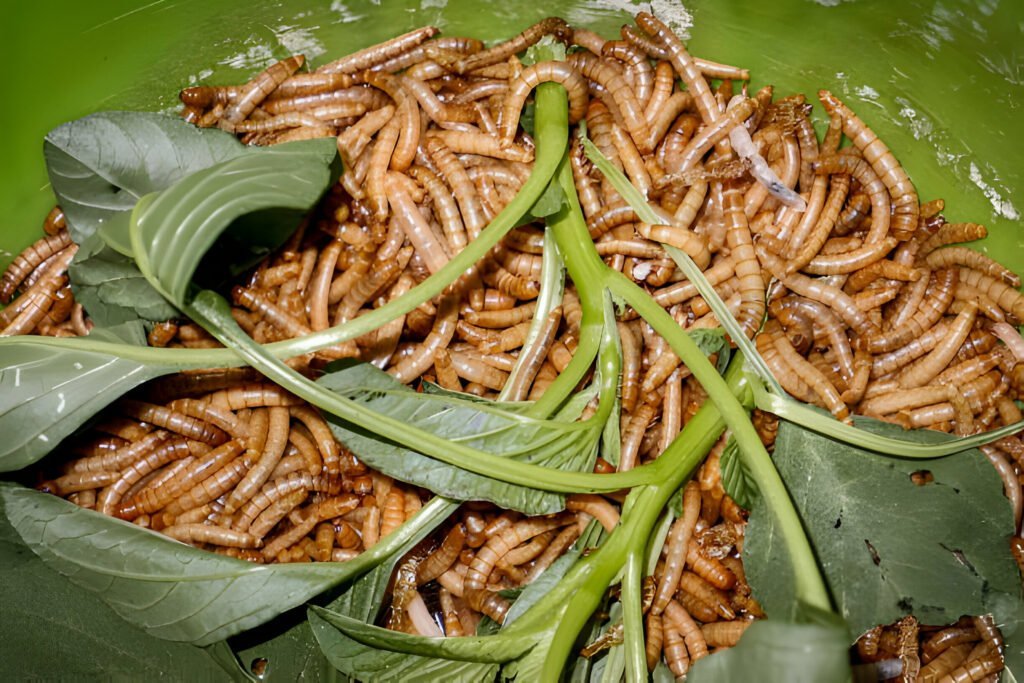
Mealworm beetles are often overlooked as a potential food source for leopard geckos. However, they can be a nutritious addition to their diet. In this section, we will discuss the benefits of mealworm beetles for leopard geckos.
Protein Content
Protein is an essential nutrient for leopard geckos, as it helps with growth, maintenance, and repair of their body tissues. Mealworm beetles are a good source of protein, containing around 20% protein by weight. This makes them a great supplement to a leopard gecko’s diet, especially for those that require more protein, such as growing juveniles or breeding adults.
Fat Content
Fat is another important nutrient for leopard geckos, as it provides them with energy and helps with the absorption of certain vitamins. Mealworm beetles are also a good source of fat, containing around 13% fat by weight. However, it is important to note that too much fat can be harmful to leopard geckos, so mealworm beetles should be fed in moderation.
In conclusion, mealworm beetles can be a beneficial addition to a leopard gecko’s diet, providing them with a good source of protein and fat. When feeding mealworm beetles, it is important to ensure that they are gut-loaded and dusted with calcium powder to provide additional nutrients. As with any food source, moderation is key to ensuring a balanced and healthy diet for your leopard gecko.
Risks and Considerations
When considering feeding mealworm beetles to leopard geckos, there are a few risks and considerations to keep in mind. In this section, we will discuss the chitin content of mealworm beetles and their potential for causing impaction.
Chitin Content
Mealworm beetles have a hard exoskeleton made of chitin, which can be difficult for leopard geckos to digest. While some chitin is necessary in a leopard gecko’s diet, too much can lead to digestive issues such as impaction. It is important to note that the chitin content of mealworm beetles is much higher than that of mealworms themselves.
Potential for Impaction
As mentioned, the chitin content of mealworm beetles can lead to impaction in leopard geckos. Impaction occurs when the gecko is unable to pass food through its digestive system, leading to blockages and potentially serious health issues. While leopard geckos are able to pass small amounts of chitin, feeding too many mealworm beetles can increase the risk of impaction.
To minimize the risk of impaction, it is recommended to only feed mealworm beetles as an occasional treat rather than a regular part of a leopard gecko’s diet. It is also important to ensure that the beetles are gut-loaded and properly sized for the gecko’s age and size. If you notice any signs of digestive issues or impaction, such as decreased appetite or lethargy, it is important to seek veterinary care immediately.
In conclusion, while mealworm beetles can be fed to leopard geckos, it is important to be aware of the potential risks and considerations. By taking proper precautions and monitoring your gecko’s health, you can safely offer these treats as part of a balanced diet.
Preparation and Feeding Guidelines
Proper Gut-Loading
Before feeding mealworm beetles to leopard geckos, it is essential to ensure that the insects are properly gut-loaded. This means that the beetles have been fed a nutritious diet for at least 24 hours before being offered to the geckos. We recommend using commercial gut-loading products or feeding the beetles a variety of fresh fruits and vegetables such as carrots, sweet potatoes, and leafy greens.
It is important to avoid feeding mealworm beetles foods that are high in fat or low in nutritional value, as this can lead to health problems in leopard geckos. Additionally, we recommend dusting the beetles with a calcium supplement before feeding them to ensure that the geckos receive adequate calcium.
Serving Size and Method
When feeding mealworm beetles to leopard geckos, it is important to consider the size and age of the gecko. We recommend offering small amounts of beetles to young geckos and gradually increasing the serving size as they grow. Adult geckos can be offered larger quantities of beetles.
Mealworm beetles can be offered live or pre-killed. Live beetles can be placed directly into the gecko’s enclosure, while pre-killed beetles can be offered using feeding tongs. It is important to monitor the gecko during feeding to ensure that they are consuming the beetles and not leaving them uneaten in their enclosure.
In summary, properly gut-loading mealworm beetles and offering appropriate serving sizes are important factors to consider when feeding them to leopard geckos. By following these guidelines, we can ensure that our geckos receive a nutritious and balanced diet.
Alternative Food Sources

If you’re looking for alternative food sources for your leopard gecko, there are a few options to consider. In this section, we’ll discuss two popular options: crickets and dubia roaches, and commercial diets.
Crickets and Dubia Roaches
Crickets and dubia roaches are both good options for leopard geckos. They are high in protein and easy to find at most pet stores. However, it’s important to make sure that the crickets or dubia roaches are the right size for your leopard gecko. Too large of a prey item can cause digestive issues or even impactation.
When feeding crickets or dubia roaches, it’s important to gut-load them first. This means feeding them a nutritious diet before offering them to your leopard gecko. This will ensure that your leopard gecko is getting all the necessary nutrients.
Commercial Diets
There are a variety of commercial diets available for leopard geckos. These diets come in the form of pellets or powders that can be mixed with water to create a paste. They are designed to provide a complete and balanced diet for your leopard gecko.
When choosing a commercial diet, it’s important to look for one that is specifically formulated for leopard geckos. Some commercial diets are designed for other reptiles and may not provide the necessary nutrients for leopard geckos.
It’s also important to note that some leopard geckos may not take to commercial diets right away. It may take some time and patience to get your leopard gecko to accept the new food. Gradually introducing the new food and mixing it with their current diet can help with the transition.
In conclusion, crickets and dubia roaches, and commercial diets are both good alternative food sources for leopard geckos. It’s important to make sure that the prey items are the right size and gut-loaded before feeding. When choosing a commercial diet, look for one that is specifically formulated for leopard geckos.
Monitoring Your Leopard Gecko’s Health
As responsible pet owners, it is important to monitor our leopard geckos’ health regularly. This involves keeping track of their weight and examining their stool. Here are some tips on how to monitor your leopard gecko’s health:
Weight Tracking
Monitoring your leopard gecko’s weight is crucial in ensuring their overall health. We recommend weighing your leopard gecko once a week using a digital kitchen scale. Keep a record of their weight in a journal or spreadsheet to track their progress.
If you notice a sudden drop in weight, it could be a sign of illness or stress. In this case, we recommend consulting with a veterinarian who specializes in reptiles.
Stool Examination
Examining your leopard gecko’s stool is another important aspect of monitoring their health. We recommend checking their stool once a week for any abnormalities such as diarrhea, blood, or undigested food.
If you notice any abnormalities, it could be a sign of an underlying health issue. In this case, we recommend consulting with a veterinarian who specializes in reptiles.
In conclusion, monitoring your leopard gecko’s health is crucial in ensuring their overall well-being. By keeping track of their weight and examining their stool, we can catch any health issues early and ensure our leopard geckos live a long and healthy life.
Frequently Asked Questions
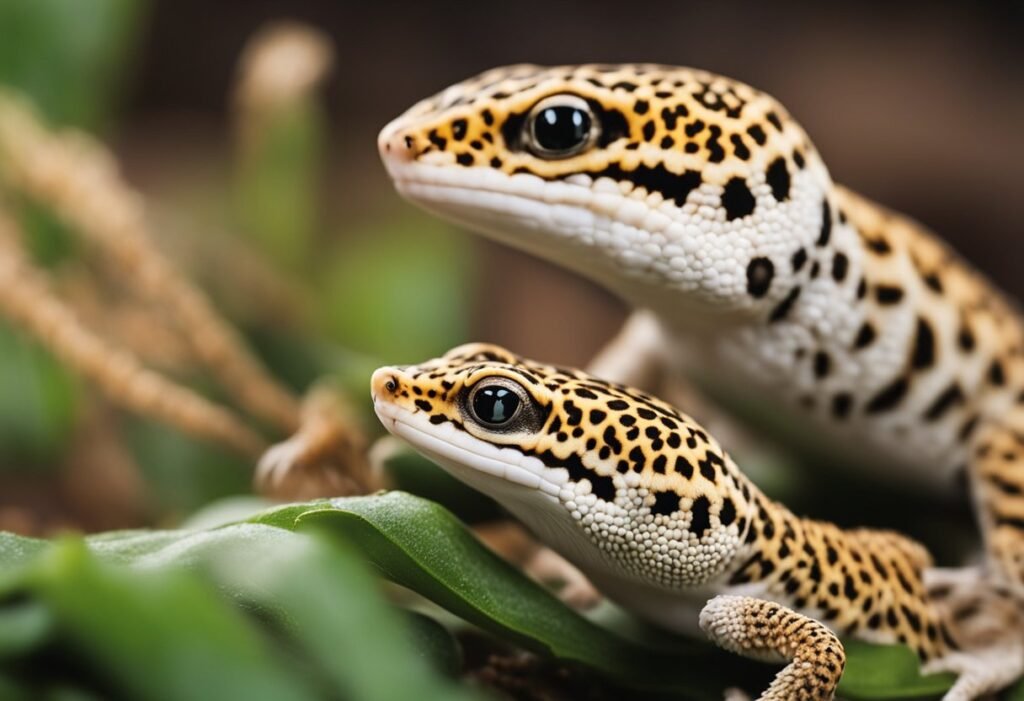
What insects are considered safe and nutritious for leopard geckos to eat?
Leopard geckos are insectivores and require a diet that is high in protein. Some insects that are safe and nutritious for leopard geckos to eat include crickets, dubia roaches, mealworms, and waxworms. It is important to note that a varied diet is key to ensuring your leopard gecko receives all necessary nutrients.
How do mealworm beetles compare to crickets in a leopard gecko’s diet?
Mealworm beetles are not as nutritious as crickets and should not be the primary source of protein in a leopard gecko’s diet. However, they can be used as a supplement to provide variety in their diet.
Can the consumption of darkling beetles pose a risk to leopard geckos?
Darkling beetles, which are the adult form of mealworms, can pose a risk to leopard geckos if consumed in large quantities. They contain a hard exoskeleton that can be difficult for leopard geckos to digest, potentially leading to impaction. It is recommended to remove any darkling beetles from the enclosure to prevent accidental consumption.
Is it safe for leopard geckos to include a variety of beetles in their diet?
Yes, it is safe for leopard geckos to include a variety of beetles in their diet as long as they are not the primary source of protein. A varied diet is important to ensure they receive all necessary nutrients.
What should you do with beetles that emerge from mealworm cultures in leopard gecko enclosures?
If beetles emerge from mealworm cultures in leopard gecko enclosures, they should be removed immediately to prevent accidental consumption. It is important to regularly clean and maintain the enclosure to prevent the buildup of waste and uneaten food.
How can you safely incorporate mealworm beetles into a leopard gecko’s feeding regimen?
Mealworm beetles can be safely incorporated into a leopard gecko’s feeding regimen as a supplement to their primary source of protein. However, it is important to limit the amount of mealworm beetles given to prevent impaction. It is also recommended to gut-load the mealworms before feeding to increase their nutritional value.

